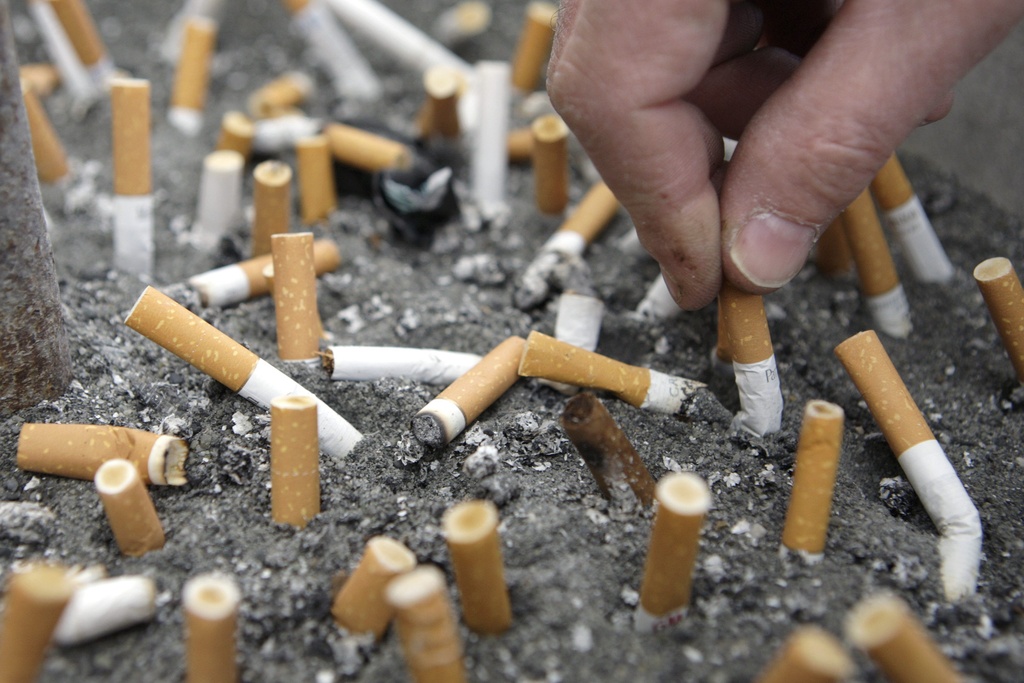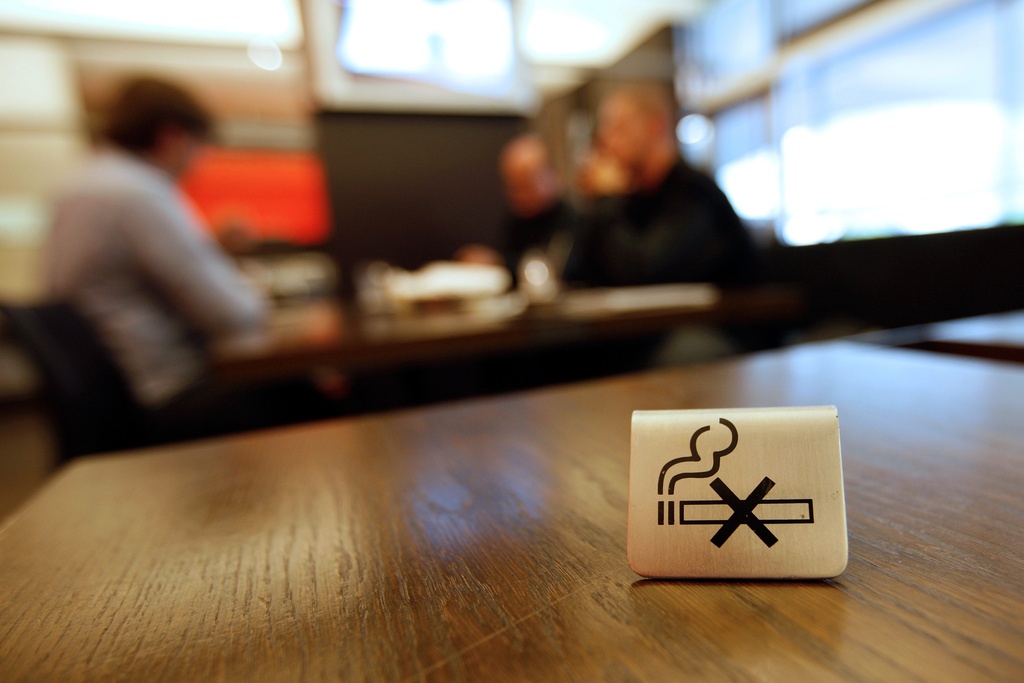“The passive smoking laws are killing me”

On World No Tobacco Day, a year after the Swiss banned smoking in public places, swissinfo.ch tests the air and hears whether the law goes too far – or not far enough.
After much pressure from non-smokers, who point out that more than 9,000 Swiss die prematurely from smoking every year, a nationwide smoking ban came into effect on May 1, 2010.
Smoking is now forbidden in Swiss public spaces such as restaurants, bars, schools and cinemas. However, establishments can build separate ventilated smoking rooms, and locales smaller than 80 square metres may become designated smokers’ dens.
Although the Federal Health Office says it’s too early to judge to what extent things have changed in the past 12 months, the Swiss Lung Association is claiming a success, pointing to national and international studies which show that comprehensive laws can cut heart attacks.
“The positive effects of a smoke-free working environment for one’s health – specifically heart, lungs and breathing – are already apparent after just a short time,” Cornelis Kooijman, the organisation’s head of air quality, told swissinfo.ch.
“In April 2011 the Hospital San Giovanni in Bellinzona published the first results of a study which showed that in Ticino the number of heart attacks dropped by 20 per cent in the two years after restaurants banned smoking.”
Jürg Hurter, president of anti-smoking organisation Pro Aere, which initiated the present law, agrees: “Finally, the population is largely protected from the hazardous effects of second-hand tobacco smoke.”
Economic argument
Not everyone, however, was happy to see the country’s smoking laws tightened.
After a hard-fought debate, GastroSuisse, the national federation of hoteliers and restaurateurs, settled on what it calls a “balanced, measured and appropriate compromise” which “protects non-smokers and gives hoteliers a certain amount of leeway on how to run their business”.
In a statement published last month, GastroSuisse admitted that the national smoking ban had not had the negative impact feared by many in the industry.
People in Switzerland spent about SFr26 billion ($29.5 billion) on wining and dining out in 2010 – SFr3.3 billion more than in 2009, according to GastroSuisse.
“Restaurants are benefiting from new customers, healthy staff and savings on cleaning costs,” Kooijman said.
“Figures cited by the media or GastroSuisse concerning loss of income are based solely on estimations by restaurant owners – they’re not scientific studies on the economic development in the catering sector.”
“Catastrophe!”
Donatella Del Vecchio from Addiction Info Switzerland added that several reports “clearly showed” that the total turnover of bars and restaurants had not dropped since last year “since many guests welcome a smoke-free environment”.
“We think the passive smoking measures are today widely accepted by the public,” she told swissinfo.ch. “Not smoking is becoming increasingly normal – and that’s a positive and welcome development.”
But Reinhard Jungo, owner of a billiards, poker and darts hall in Bern, told swissinfo.ch that since May 2010 he had seen the number of guests drop by about 20 per cent – despite spending about SFr15,000 on a fumoir, an enclosed ventilated space.
“From a health point of view the law makes perfect sense; but from a business point of view it’s a catastrophe. It’s killing me!” he said.
Jungo, a non-smoker, admits that the promise of clean air had attracted some new players – “but not enough to replace those who left”.
Health vs profit
Christophe Berdat, regulatory affairs manager at British American Tobacco Switzerland, told swissinfo.ch that cigarette sales had “probably gone down a bit” since last May, but he said a significant change had failed to occur because some cantons had already introduced passive smoking laws in 2007 and 2008.
“The trend is going down in every European country and even in the United States, but we didn’t see a situation like in Ireland or Britain – a big difference with the introduction of the law.”
Jürg Hurter is quick to dismiss economic arguments for opposing the ban.
“This is of absolutely no importance! If an activity is dangerous to a third party, it has to be stopped – even if some people say it will affect their business. Even if the restaurant industry were affected – and it is not – it has to accept that there are much more important issues than their profit,” he said.
“For example, the legal obligation of cleaning the restaurant kitchen affects profit, nevertheless restaurants are – in the interest of public health – forced to clean their kitchens. This is not up for discussion.”
New initiative
Although Hurter welcomed the current law, he says a lot more remains to be done, especially concerning ventilated spaces where service is provided as long as staff agree to work there.
“The current legislation shows the disrespect of the restaurant industry towards their workers,” he said.
Kooijman agrees. “It’s doubtful whether such agreement is given voluntarily. Staff are thus not effectively protected from passive smoking and have to risk their health.”
He welcomes the fact that cantons can choose to implement tighter regulations, “but this system does lead to a clutter of cantonal laws”.
To clear up what they consider a mess, on May 18, 2010, an anti-smoking alliance handed in 133,000 signatures demanding a federal law which would ban smoking in all public places across the country – the only exception being unstaffed fumoirs.
The Swiss will now vote on this, probably in 2013, and the initiative appears to have a good chance – last year more than 80 per cent of voters in canton Geneva signalled their approval. But to the disappointment of many, the government has said it will call for the initiative to be rejected.
“The law that entered into effect on May 1, 2010, provides an adequate nationwide minimal regulation. It also enables cantons to issue further regulations to protect people’s health,” Federal Health Office spokesman Jean-Louis Zurcher told swissinfo.ch.
“Most workers in the gastronomy sector are today effectively protected.”
On May 31 each year the World Health Organization (WHO) marks World No Tobacco Day, highlighting the health risks associated with tobacco use and advocating for effective policies to reduce consumption.
Tobacco use is the second cause of death globally (after hypertension) and is currently responsible for killing one in ten adults worldwide, around five million people a year.
The World Health Assembly created World No Tobacco Day in 1987 to draw global attention to the tobacco epidemic and its lethal effects. It provides an opportunity to highlight specific tobacco control messages and to promote adherence to the WHO Framework Convention on Tobacco Control. Switzerland is one of the few countries not to have ratified the convention.
Tobacco use is the number one preventable epidemic that the health community faces.
In Switzerland, every year more than 9,000 people die prematurely from smoking – two-thirds are men. That’s 25 people a day and more than double the total number of road deaths, drug overdoses, homicides and suicides combined.
In Switzerland, 20 cigarettes currently cost SFr7.40 ($8.40).
(source: WHO and Federal Health Office)
There is no safe level of second-hand tobacco smoke. Smoke-free laws protect the health of non-smokers, are popular, do not harm business and encourage smokers to quit.
Second-hand smoke causes 600,000 premature deaths a year globally, of whom around 1,000 are in Switzerland.
Almost half of children – whose organs are damaged by passive smoke more than adults – regularly breathe air polluted by tobacco smoke. In 2004, children accounted for 28% of the global deaths attributable to second-hand smoke.
In adults, second-hand smoke causes serious cardiovascular and respiratory diseases, including coronary heart disease and lung cancer. In infants, it causes sudden death. In pregnant women, it causes low birth weight.
(source: WHO and Federal Health Office)

In compliance with the JTI standards
More: SWI swissinfo.ch certified by the Journalism Trust Initiative





You can find an overview of ongoing debates with our journalists here. Please join us!
If you want to start a conversation about a topic raised in this article or want to report factual errors, email us at english@swissinfo.ch.